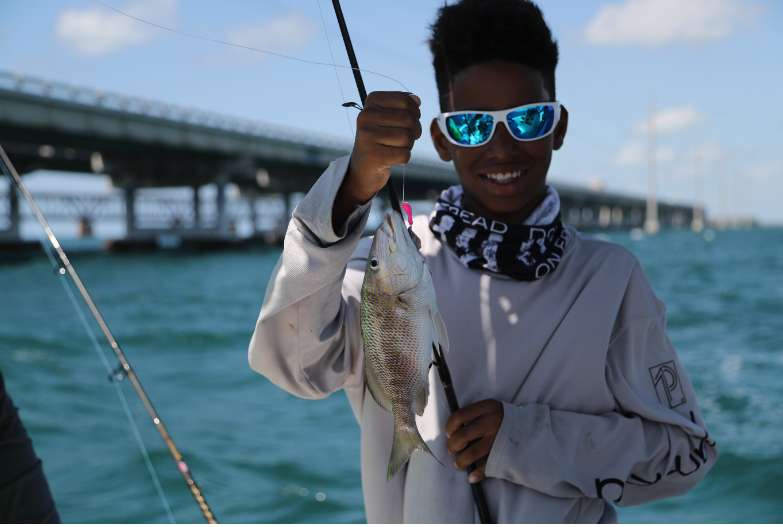
Go Fish: Recreational Fishing around the National Marine Sanctuary System
Our national marine sanctuaries are our underwater blue parks, with so many ways to enjoy them from surfing swells to paddling alongside history to diving the bright blue waters. But, one of the most popular in America is recreational fishing.
Recreational fishing is an integral part of American coastal life and communities, offering both economic vitality and conservation benefits. And, about 98 percent of national marine sanctuary waters offer the opportunity to do so.
Many of our national marine sanctuaries boast natural and cultural resources, like the crystal blue waters of the Florida Keys and the otherworldly diversity of Gray’s Reef, that are perfect for sustainable recreational fishing. Other sanctuaries that offer exceptional recreational fishing include: Flower Garden Banks, Olympic Coast, Monterey Bay, Channel Islands, Hawaiian Islands Humpback Whale and Stellwagen Bank national marine sanctuaries. And the diversity of the catch is enough to entice any angler:
Channel Islands
Calico bass
Sheephead
Rockfish
Lingcod
Florida Keys
King Mackerel
Bonefish
Sailfish
Flower Garden Banks
Snapper
Grouper
King Mackerel
Great Amberjack
Wahoo
Stellwagen Bank
Haddock
Atlantic Mackerel
Bluefin Tuna
Pollock
Blue Shark
Hawaiian Islands Humpback Whale
Yellowfin Tuna
Mahi mahi
Wahoo
Bluefin Trevally
Bonefish
Olympic Coast
Halibut
Rockfish
Salmon
Lingcod
Gray’s Reef
Grouper
Snapper
King Mackerel
Cobia
Monterey Bay
Halibut
Rockfish
Salmon
Lingcod
Offering more than just a fun and relaxing hobby, sustainable recreational fishing provides significant economic and conservation value to local communities. In 2015, nearly 9 million saltwater anglers generated $63 billion in sales impacts and $22 billion in income impacts and supported 439,000 U.S. jobs.
Many anglers are key stewards of the waters they fish and support marine conservation efforts through purchasing licenses and permits and paying fees on fishing equipment. These responsible anglers know the harms to fishing that occurs when the marine ecosystem is compromised or overfishing occurs.
As people close to and often near the water, fishermen and women have the opportunity to support and improve marine conservation efforts by practicing sustainable fishing techniques; advocating for better fisheries data and science; improving fish habitat; and engaging in the marine policy process, especially in national marine sanctuaries. The National Marine Sanctuary Foundation is partnering with The Nature Conservancy, Gray’s Reef National Marine Sanctuary, and recreational fishers at Gray’s Reef to share best practices for handling deep-water species like snapper and grouper. The project is also developing an online platform to train and inform recreational fishers on best practices and the use of descending devices. This work will help inform regional sustainable fisheries efforts around Gray’s Reef.

National marine sanctuaries connect Americans with underwater wonders while also protecting them from threats. Sustainable recreational fishing provides the opportunity to enjoy the best that nature has to offer while stimulating economic impact and encouraging responsibility for our blue planet. The Blue Star Fishing Guide Program makes it easy to practice responsible fishing. By booking with a Blue Star recognized charter, you can lessen your impact on the ecosystem and enjoy your day knowing your operator is dedicated to promoting sustainable fishing practices and habitat conservation.
On July 31st – August 2nd, 2019, NOAA’s Office of National Marine Sanctuaries is hosting a virtual Get Into Your Sanctuary weekend to celebrate our wondrous national marine sanctuaries and the value of these special places as iconic destinations for responsible recreation. Check out the schedule of events to virtually recreate around the national marine sanctuary system including a discussion on recreational fishing at Gray’s Reef National Marine Sanctuary.
As you plan your next fishing trip, think about how you can do so responsibly. National outdoor recreation groups have released guidelines on how to Recreate Responsibly. Here are their tips, based on recommendations from the Centers for Disease Control, state and local public health authorities, and recreation experts:
To learn more about how to keep yourself, your peers, and your outdoors healthy, visit: recreateresponsibly.org. And to share how your recreate responsibly, use #RecreateResponsibly and/or #RecrearResponsablemente. The waters within NOAA’s national marine sanctuaries remain open for responsible enjoyment in accordance with CDC guidance and local regulations.
